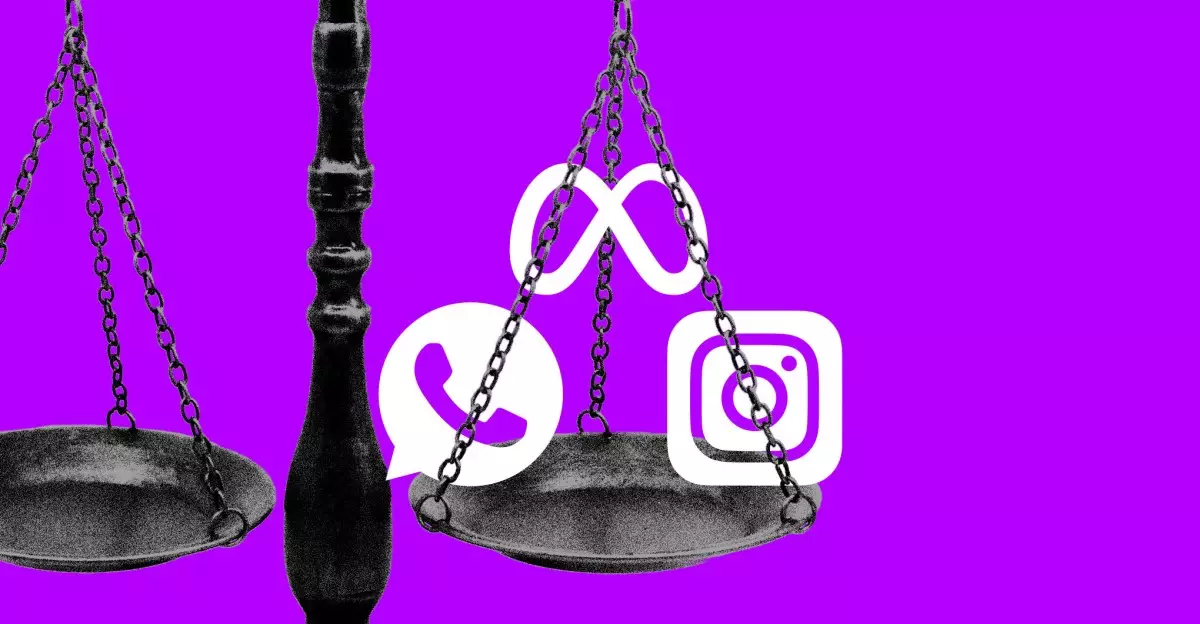In a courtroom scenario that felt more like a theatrical play than a legal proceeding, Mark Zuckerberg stood before the federal authorities, defending the monumental acquisitions of Instagram and WhatsApp. The stakes could not have been higher; the FTC’s antitrust lawsuit aimed at dismantling what they allege to be a ‘kill strategy’ purportedly enacted by Zuckerberg to cement Meta’s dominance in social media. Yet, as the trial unfolded, Zuckerberg’s demeanor and confidence suggested a different narrative: one of foresight, strategic maneuvering, and a touch of audacity that has characterized his entrepreneurial journey.
When Zuckerberg was asked whether he regretted the $19 billion spent on WhatsApp, a smirk creased his face, and his enthusiastic response, “I’d do it again,” encapsulated a sentiment that many in the tech industry understand all too well—the belief that the perceived risks of such acquisitions are often dwarfed by their long-term rewards. This mindset, one might argue, is essential for innovation; it corners conventional wisdom and shifts the narrative around risk, scalability, and vision.
The Tug-of-War with Competition
A major thrust of the FTC’s case revolves around the assertion that Zuckerberg acquired both Instagram and WhatsApp not to foster their growth, but to eliminate potential competitors that could challenge Meta’s preeminence. This narrative hinges on a rather simplistic view of market dynamics, ignoring the complexities involved in maintaining a competitive edge. During the trial, Zuckerberg remarked on his conversations with WhatsApp founders Jan Koum and Brian Acton, noting their disdain for ads and social media—an admission that reinforces the argument against allegations of a predatory acquisition strategy.
While it’s easy to frame Zuckerberg as an opportunistic mogul intent on quashing competition, a closer look reveals a founder grappling with an evolving market landscape. The rise of messaging apps indicated a tectonic shift in user behavior; conversations migrated from public spheres like the Facebook News Feed to private messaging threads. Recognizing this trend demanded a proactive approach, and Zuckerberg’s decision to harness WhatsApp’s capabilities was rooted in foresight. It also underscored an essential truth: in technology, being reactive often means destabilizing your own platform.
Instagram: Neutralization or Nurturing?
Instagram’s purchase trajectory presents another layer of complexity. The acquisition price may have raised eyebrows at the time, with even Sheryl Sandberg admitting in court that Facebook paid “way too much.” However, in hindsight, Zuckerberg’s initial doubts about Instagram’s potential fueled a commitment that blossomed into an extraordinary asset. Fast-forward to today, and Instagram boasts over 2 billion active users, a testament to its market viability and audience affinity.
Ironically, the argument that Zuckerberg’s acquisition strategies were meant to ‘neutralize’ competition becomes trickier when examining Instagram’s growth under Meta. While Zuckerberg expressed concern over Instagram siphoning off engagement from Facebook, his directive to the Instagram team to depend less on Facebook for traffic seems to denote a trust in their ability to thrive independently. This nurturing approach contradicted the allegations of an oppressive kill strategy, transforming Zuckerberg’s narrative from that of a monopolist to a supporter of entrepreneurial growth within the Meta ecosystem.
The Factual Depths of Audience Engagement
As Zuckerberg detailed the rise of both platforms from modest beginnings—WhatsApp with its 10 million users and Instagram with even fewer—it painted a promising picture of digital evolution powered by strategic investments. Zuckerberg’s unwillingness to see these apps as ephemeral entities resonates with the emerging paradigm of social engagement: the understanding that shifting user preferences necessitate accommodating platforms.
The success of WhatsApp and Instagram as revenue-generating entities for Meta challenges the simplistic narrative of monopolistic aspirations. WhatsApp alone reportedly generates around $10 billion yearly through ads that facilitate business interactions, placing these acquisitions in a different light—one which reveals Meta’s role as a catalyst for connectivity and commerce rather than a mere suppressor of competition.
The Undertones of Accountability
Yet, amidst this narrative of flourishing investments and strategic foresight lies an undeniable truth: the tech industry must hold itself accountable. The intricate dance between innovation and ethics remains ever-relevant, as corporations like Meta navigate the treacherous waters of user privacy, data security, and market influence. While Zuckerberg’s testimony might frame his acquisitions as visionary, the dialogue around the monopoly raises broader questions about the balance of power in the digital age.
The accumulation of enormous influence by a few platforms can lead to concerning outcomes, such as the erosion of diversity and opportunity. Meta, with its expansive reach, carries not only the responsibility to foster engagement but also to ensure that such interactions represent the broader spectrum of society. As we scrutinize Zuckerberg’s claims of strategic brilliance, it is essential to dissect the implications of such power on collective digital engagement futures, asking, at what cost does this ingenuity come?
The court’s proceedings might focus on antitrust considerations, but they also unveil a pressing dialogue about morality in technology—a conversation that we must engage in as digital citizens navigating this rapidly evolving landscape.

